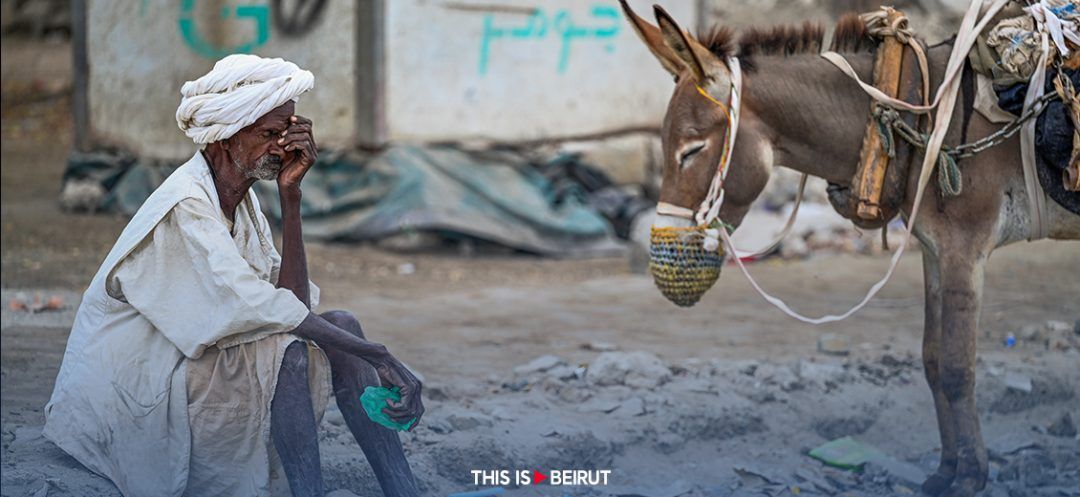- Home
- Middle East
- War-Ravaged Sudan Witnesses Massive Fleeing

©(Photo by AFP)
Considered among the world's poorest countries, war-torn Sudan's already fragile infrastructure has pushed the country to the brink of famine, leading to a massive ongoing exodus from the country.
One year since the conflict in Sudan erupted, thousands of desperate people are still fleeing the country daily "as if the emergency had started yesterday," the UN said on Tuesday.
More than 8.5 million people have fled their homes since the fighting broke out, with nearly 1.8 million having escaped across the country's borders.
"A year on, the war in Sudan continues to rage, with the country and its neighbors experiencing one of the largest and most challenging humanitarian and displacement crises in the world," said Olga Sarrado Mur, spokeswoman for the United Nations' refugee agency UNHCR.
"The ongoing conflict has shattered people's lives, filling them with fear and loss. Attacks on civilians, and conflict-related sexual and gender-based violence, continue unabated," she told a press briefing in Geneva. "Sudan has experienced the almost complete destruction of its urban middle class: architects, doctors, teachers, nurses, engineers, and students have lost everything," she added.
Fighting in Sudan erupted on April 15 last year between the regular army and the paramilitary Rapid Support Forces. The conflict has killed thousands and has sparked a humanitarian disaster. "Thousands are crossing borders daily as if the emergency had started yesterday," Sarrado Mur said.
Those fleeing the country, mostly women and children, are arriving in remote areas across the borders "with little to nothing and in desperate need of food, water, shelter and medical care," she added. "As the conflict continues, and the lack of assistance and opportunities deepens, more people will be forced to flee Sudan to neighboring countries or to move further."
At least three drones struck Sudanese army targets Tuesday in the eastern state of Gedaref, which had previously been largely spared in the country's devastating war, military and security sources said.
One drone "struck state security and intelligence headquarters, but did not cause significant damage," according to a security source from Gedaref, more than 400 kilometers (250 miles) east of the capital Khartoum.
Eastern Sudan had until now been considered a safe haven for millions of civilians displaced from Khartoum and other battlegrounds.
Marie-Helene Verney, UNHCR's representative in South Sudan, said 635,000 people had arrived in the country since April 15 -- the equivalent of five percent of the country's population. "This is the world's poorest country, so you can imagine the pressure," she said, via video-link from the capital Juba.
Verney said many refugees were urban, educated and middle class, with professional skills that UNHCR is trying to match to shortages in South Sudan, notably in health and education.
A lot of unaccompanied children were coming, and single women with "heartbreaking stories" of sexual violence en route, she added.
On Monday, UN human rights chief Volker Turk said the current situation in Sudan concerning sexual and gender-based violence was "absolutely horrific."
"It is committed by all parties to the conflict in this absolutely senseless war," he said.
With AFP
One year since the conflict in Sudan erupted, thousands of desperate people are still fleeing the country daily "as if the emergency had started yesterday," the UN said on Tuesday.
More than 8.5 million people have fled their homes since the fighting broke out, with nearly 1.8 million having escaped across the country's borders.
"A year on, the war in Sudan continues to rage, with the country and its neighbors experiencing one of the largest and most challenging humanitarian and displacement crises in the world," said Olga Sarrado Mur, spokeswoman for the United Nations' refugee agency UNHCR.
"The ongoing conflict has shattered people's lives, filling them with fear and loss. Attacks on civilians, and conflict-related sexual and gender-based violence, continue unabated," she told a press briefing in Geneva. "Sudan has experienced the almost complete destruction of its urban middle class: architects, doctors, teachers, nurses, engineers, and students have lost everything," she added.
Fighting in Sudan erupted on April 15 last year between the regular army and the paramilitary Rapid Support Forces. The conflict has killed thousands and has sparked a humanitarian disaster. "Thousands are crossing borders daily as if the emergency had started yesterday," Sarrado Mur said.
Those fleeing the country, mostly women and children, are arriving in remote areas across the borders "with little to nothing and in desperate need of food, water, shelter and medical care," she added. "As the conflict continues, and the lack of assistance and opportunities deepens, more people will be forced to flee Sudan to neighboring countries or to move further."
Sudan Army Targeted
At least three drones struck Sudanese army targets Tuesday in the eastern state of Gedaref, which had previously been largely spared in the country's devastating war, military and security sources said.
One drone "struck state security and intelligence headquarters, but did not cause significant damage," according to a security source from Gedaref, more than 400 kilometers (250 miles) east of the capital Khartoum.
Eastern Sudan had until now been considered a safe haven for millions of civilians displaced from Khartoum and other battlegrounds.
Strain on South Sudan
Marie-Helene Verney, UNHCR's representative in South Sudan, said 635,000 people had arrived in the country since April 15 -- the equivalent of five percent of the country's population. "This is the world's poorest country, so you can imagine the pressure," she said, via video-link from the capital Juba.
Verney said many refugees were urban, educated and middle class, with professional skills that UNHCR is trying to match to shortages in South Sudan, notably in health and education.
A lot of unaccompanied children were coming, and single women with "heartbreaking stories" of sexual violence en route, she added.
On Monday, UN human rights chief Volker Turk said the current situation in Sudan concerning sexual and gender-based violence was "absolutely horrific."
"It is committed by all parties to the conflict in this absolutely senseless war," he said.
With AFP
Read more



Comments